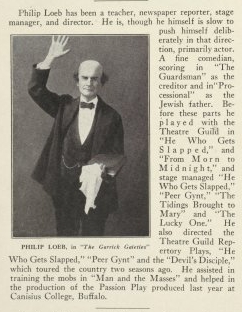
I’m in the middle of discussing “And Thereby Hangs a Tail”—a sketch based on the Scopes trial that appeared in The Garrick Gaieties, a revue that originally ran in 1925. The lyrics in the sketch are by Lorenz Hart (1895–1943), and can be found in The Complete Lyrics of Lorenz Hart (expanded edition, 1995), while the libretto is by Morrie Ryskind (1895–1985) and the revue’s director Philip Loeb (1891–1955), and can be found only in the Scherer Library of Musical Theatre at Goodspeed Musicals, the staff of which courteously and efficiently provided me with a photocopy. The sketch takes place in a courtroom in the jungle, where “[t]he defendant, Abbadaba Darwin, is charged with spreading the pernicious doctrine of evolution, which teaches that that stupid animal, man, is our grandchild.” The characters are wearing monkey masks. When part 1 concluded, the prosecutor, William Jennings Bryan, was waiting for the psychological moment to make his entrance to the courtroom.
Then, to the strains of “Tammany,” Bryan (played by Loeb) enters, followed by his brother, Charlie Bryan. While I was doing the research for this post, I formulated a trivia question that I posed to a friend whose depth of historical knowledge I find frankly astonishing: “Who was the Grover Cleveland of Nebraska?” After only a momentary detour involving walrus mustaches, my friend lived up to my expectations by replying that it was Charles W. Bryan (1867–1945), who, like Cleveland, served non-consecutive terms, as governor of Nebraska. Charlie Bryan was also the Democratic nominee for vice president, running with John W. Davis, in 1924. He might have been selected in part because of his name: his elder brother William Jennings Bryan was exceedingly familiar to the electorate, having run unsuccessfully for president in 1896, 1900, and 1908. The stage directions indicate that Charlie Bryan was wearing his famous black skullcap, although press reports suggest that he abandoned it in 1924 as he was running for vice president.
The courtroom rises as Bryan enters and sings: “I’m sure I’d rather prosecute this case / Than run another presidential race; / For the Congo’s greatest menace is / A monkey who will not believe in Genesis.” (That’s the cleverest rhyme by far in the lyrics, I think.) In lines in the original libretto but not included in The Complete Lyrics, he advertises his availability as a lecturer. Michael Kazin notes in A Godly Hero (2006) that Bryan “spent the better part of twenty summers as the star attraction on the week-long programs [of Chautauqua] that edified, titillated, and amused millions of Americans who seldom had access to a big-city theater or lecture hall.…One entrepreneur testified that Bryan was good for ‘forty acres of parked Fords, anywhere, at any time of the day or night.’” In the second verse, Bryan also alludes to his activities in promoting real estate development in Florida, to which he moved in 1913: “And every speech I make for home and mammy / Goes to build another little cabin in Miami.”
His song complete, Bryan continues to stray from the task at hand (namely prosecuting the defendant Abbadaba Darwin for spreading the pernicious doctrine of evolution) by talking about real estate with the district attorney. The judge unhelpfully asks Bryan why he brought a rabbi—the skullcapped Charlie Bryan, of course—with him. After Bryan explains that Charlie Bryan is “the one who runs for Vice-President” (presumably Bryan himself is the one who runs for president!), neither the judge nor Bryan is able to recall the name of his running mate. (Davis, a dark horse candidate, was relatively forgettable as a politician, and lost in a landslide to Coolidge in 1924, one of the worst defeats for a Democratic presidential candidate ever, but he was a major legal figure of the first half of the twentieth century, arguing 140 cases before the Supreme Court.) Bryan concludes, “If you want people to remember you[,] you’ve got to keep on running.” Then, finally, he turns his attention to the defendant.
Bryan asks Darwin whether he believes in evolution; Darwin replies, “I do.” Bryan sees no reason to examine the confessed and unrepentant defendant further. Instead, he addresses the jury, reassuring them of his respect and admiration for monkeys. “Some of my best friends are monkeys,” he says, invoking a catchphrase typically used, often unconvincingly, to disclaim prejudice. (Parenthetically, I was initially puzzled here. Is Bryan not a monkey? The stage directions say, “All the characters for this scene have monkey-masks,” but in Bryan’s address to the jury he seems to be portraying himself as a human. Eventually, I found a picture of Loeb in a souvenir program in the digital collections of the New York Public Library [see above], which indicates that he was not wearing a monkey mask in the role of Bryan.) Mopping his forehead, Bryan pauses for applause, asking Charlie how long the cheers lasted. I think that I’ll pause, too, finishing with “And Thereby Hangs a Tail” in part 3.

